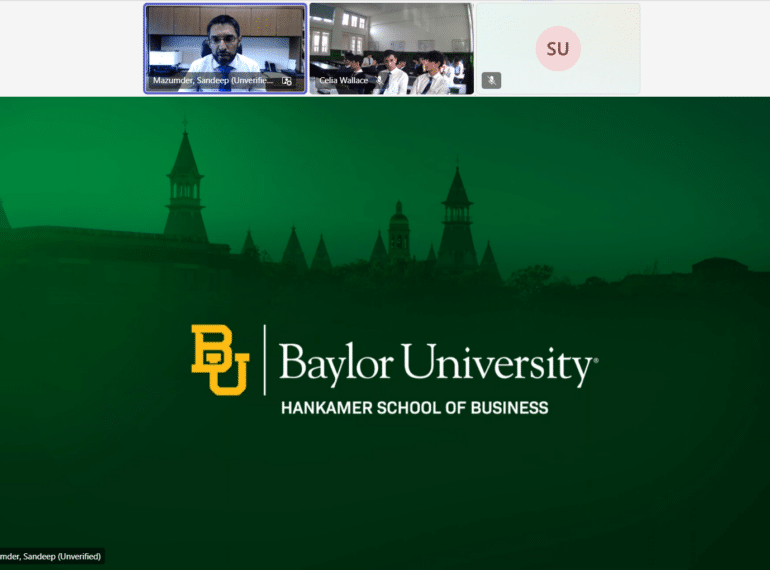
Old Elizabethan academic and economist Sandeep Mazumder queried the Bank of England’s 2% inflation target and suggested it should be higher – not because it is too cautious, but paradoxically because it is too risky.
Sandeep (OE 1993–2000), who is Dean of Hankamer School of Business at Baylor University, Texas, spoke to the group of Year 12 economists before yesterday’s news that the inflation rate had fallen to 2.3%.
Although this is its lowest level in almost three years, the figure was still higher than expected. Political commentators believe that Prime Minister Rishi Sunak has called the early General Election on the strength of the apparently improving economic outlook.
Dean Sandeep, who has published widely on inflation dynamics and the Great Recession of 2007–2009, argued that inflation at 2% would limit the Government’s room for manoeuvre in cutting interest rates during times of economic difficulty, making it hard to escape a recession.
He argued instead for adopting a 3 or 4% target, which would give more flexibility with interest rate cuts, without the risk of inflation dropping to 0%. This is the level below which rates cannot be cut (the ‘zero lower bound’) without the potentially disastrous economic risk of people hoarding cash, rather than saving it in banks, the so-called ‘liquidity trap’.
Economics teacher Celia Wallace thanked Dean Sandeep, who spoke remotely to the School’s Gresham Society for Economics. He is a member of QE’s 450 Club member and has been very supportive of the Economics department.
“Sandeep introduced several new concepts to improve pupils’ depth of understanding, including the Fisher Equation to calculate real interest rates and the problem of the zero lower bound, which was the main basis of his talk.
“Within his critique of inflation targeting, Sandeep showed other policy options which countries can often consider, including price-level targeting – where a specific price index is targeted, rather than a growth rate.”
Afterwards, the sixth-formers asked a range of questions, including Avi Juneja’s cautious query about the issue of real wage cuts with a target of 3% or 4% inflation, and Abyan Shah asking about which method of targeting would be most effective for the UK: inflation targeting, price-level targeting, or average inflation targeting (a hybrid of both systems).
Sandeep gave plentiful career advice to all. He strongly expressed the need to follow one’s strengths and passions. He said he had chosen to go into academia and research as it was his passion, while also giving more of a life balance compared to other options, such as banking.

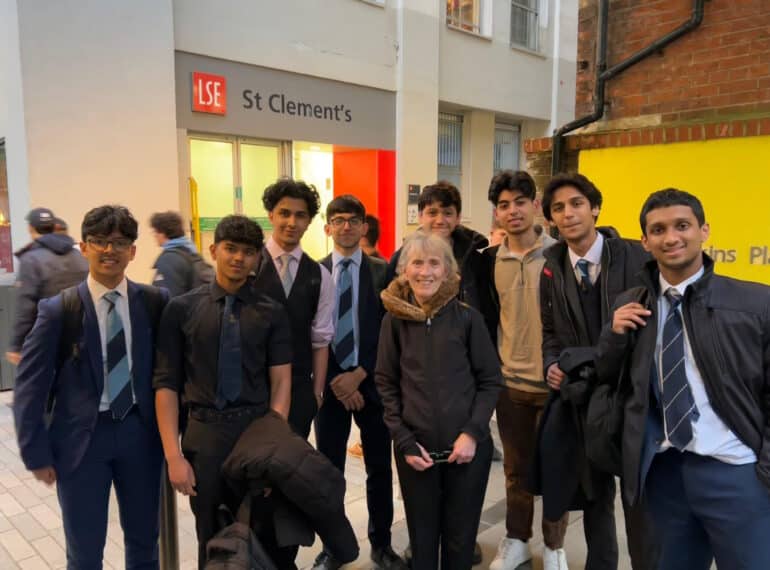
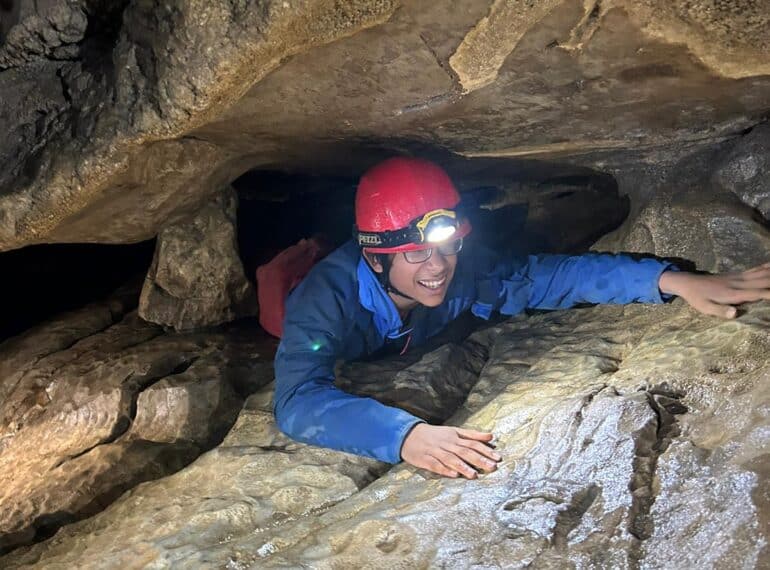
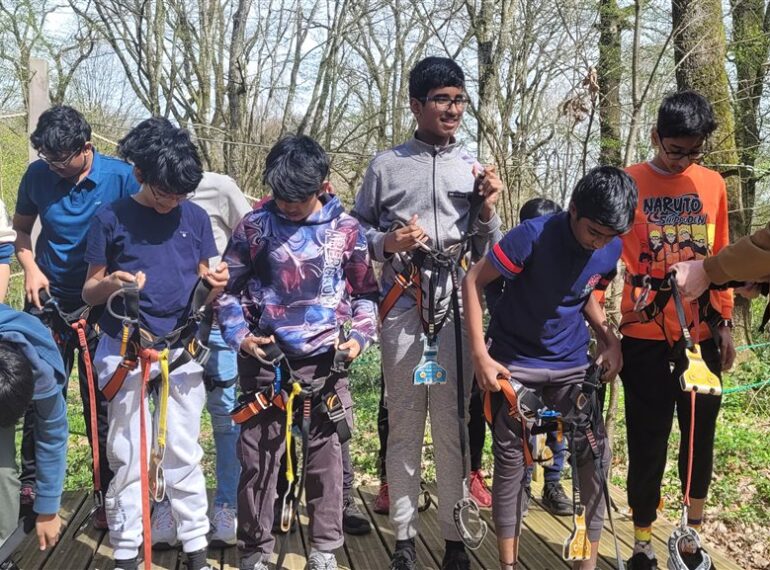
 The group were kept busy with a host of activities during their stay with pupils from QE’s partner school, Collège St Pierre, from the town of Bourg en Bresse, between Lyon and Geneva.
The group were kept busy with a host of activities during their stay with pupils from QE’s partner school, Collège St Pierre, from the town of Bourg en Bresse, between Lyon and Geneva.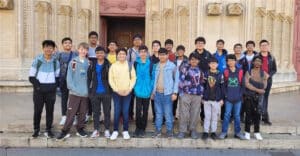 By spending evenings and the weekend of the trip with families, the QE boys were able to build their confidence in French, as well as experiencing a different way of life.
By spending evenings and the weekend of the trip with families, the QE boys were able to build their confidence in French, as well as experiencing a different way of life. The official programme also included:
The official programme also included: Noah’s fellow member of Underne form, Harsh Chavda, said: “I particularly enjoyed going to the market on the last day because it is rare to find such markets here in London. There were so many different shops – selling cheese, olives, bread, desserts, Chinese food, clothes and so much more! Some of us asked the owner of the cheese store to give us his strongest cheese, and we all tasted some. It was so strong and for me, disgusting!
Noah’s fellow member of Underne form, Harsh Chavda, said: “I particularly enjoyed going to the market on the last day because it is rare to find such markets here in London. There were so many different shops – selling cheese, olives, bread, desserts, Chinese food, clothes and so much more! Some of us asked the owner of the cheese store to give us his strongest cheese, and we all tasted some. It was so strong and for me, disgusting!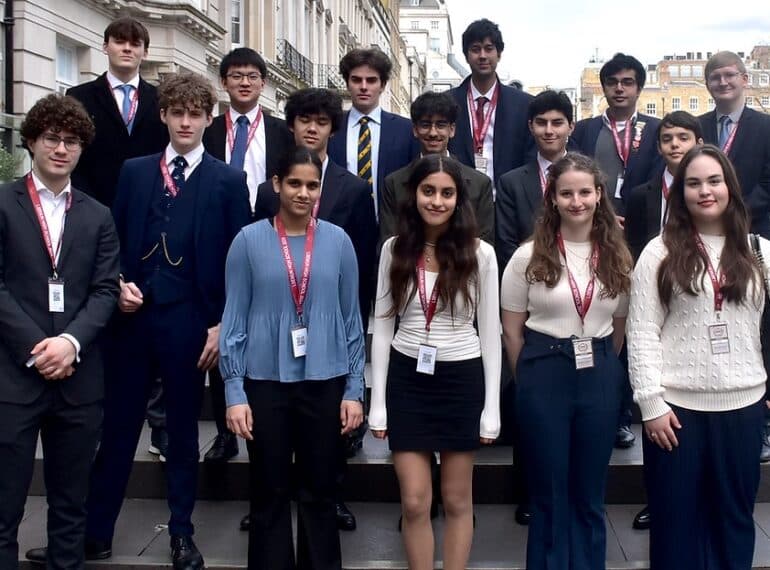
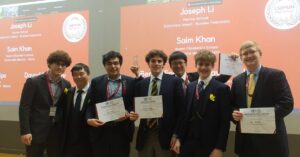 Saim Khan and Chanakya Seetharam were part of a nine-strong group from QE’s Year 12 who took part in the three-day debating event, which simulated the activities of the UN.
Saim Khan and Chanakya Seetharam were part of a nine-strong group from QE’s Year 12 who took part in the three-day debating event, which simulated the activities of the UN.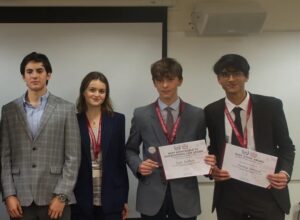 The QE delegates were split among the various committees, including the Security Council. They debated a wide range of topics, including both current conflicts and those of the past, such as the 1956-1957 Suez Crisis.
The QE delegates were split among the various committees, including the Security Council. They debated a wide range of topics, including both current conflicts and those of the past, such as the 1956-1957 Suez Crisis.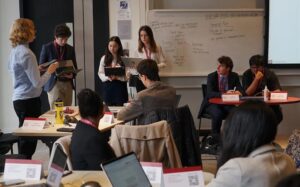 Saim relished his own role representing Malta (“not necessarily the world’s most geopolitically dominant nation”) at MUN. “Whilst I had to work much harder to establish my initial credibility and convince other delegates that the Maltese were even worth listening to, by the end of the three days I can confidently say that Malta had become the leader of the free world.”
Saim relished his own role representing Malta (“not necessarily the world’s most geopolitically dominant nation”) at MUN. “Whilst I had to work much harder to establish my initial credibility and convince other delegates that the Maltese were even worth listening to, by the end of the three days I can confidently say that Malta had become the leader of the free world.”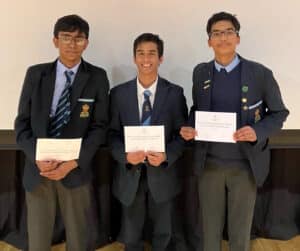 While the group were disappointed to miss out on the award for best medium-sized delegation (which went to Eton), they were, said Uday Dash, “extremely grateful to the conference for providing us with a platform to discuss real socio-economic and political matters that drastically affect our world today”.
While the group were disappointed to miss out on the award for best medium-sized delegation (which went to Eton), they were, said Uday Dash, “extremely grateful to the conference for providing us with a platform to discuss real socio-economic and political matters that drastically affect our world today”.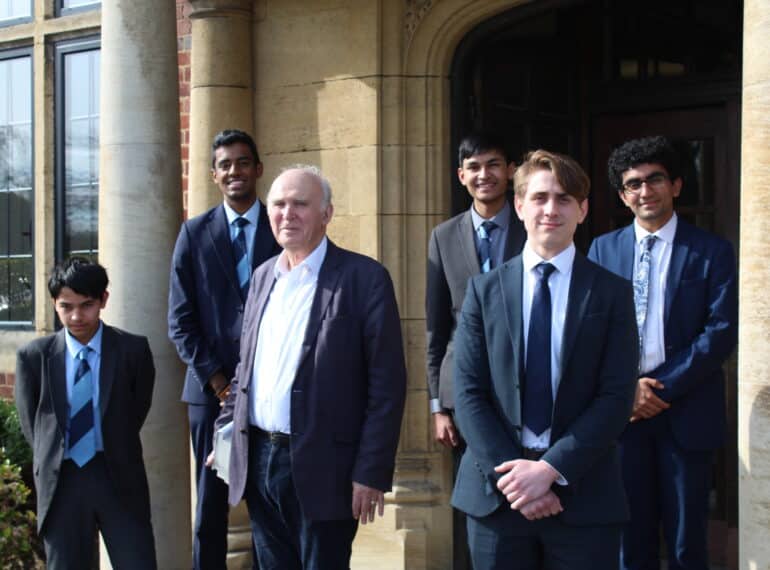
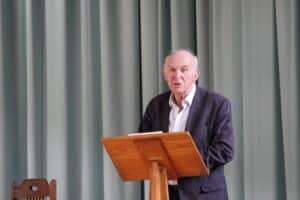 His afternoon visit to QE was led by the society’s Rishabh Bhatt, of Year 12. Before taking questions from an audience drawn from all year groups in the Main School Hall, he gave some brief advice to any aspiring politicians. They should understand the importance of:
His afternoon visit to QE was led by the society’s Rishabh Bhatt, of Year 12. Before taking questions from an audience drawn from all year groups in the Main School Hall, he gave some brief advice to any aspiring politicians. They should understand the importance of: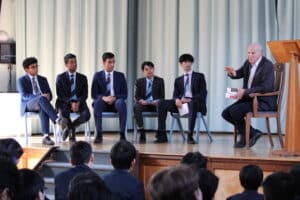 Assessing how the General Election may go overall, he said that a Labour government seems the most likely at present, but that it was entirely possible that it would not have the big majority that some, taking their cue from opinion polls, are assuming.
Assessing how the General Election may go overall, he said that a Labour government seems the most likely at present, but that it was entirely possible that it would not have the big majority that some, taking their cue from opinion polls, are assuming.